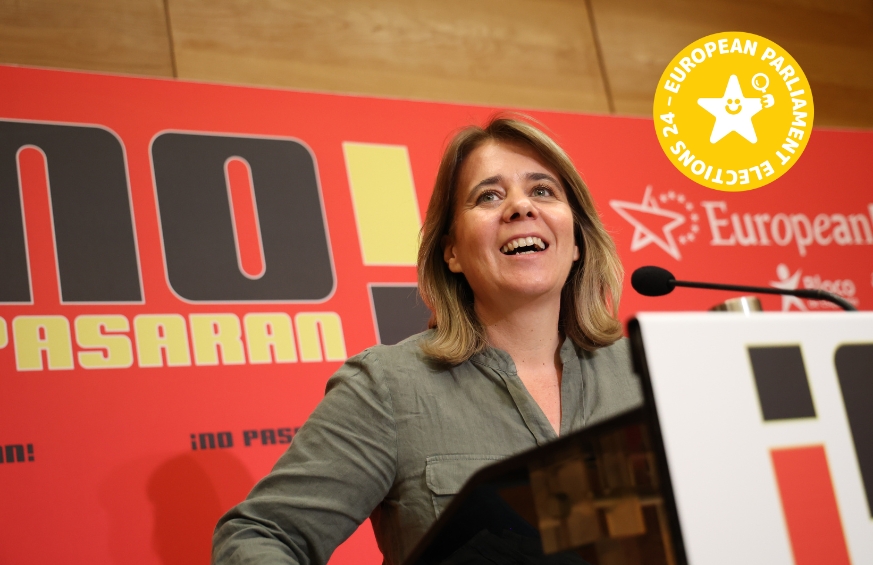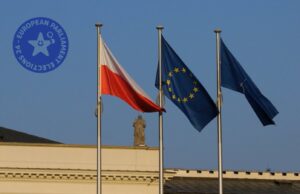
Following the far right’s electoral breakthrough in March’s snap parliamentary elections, the 2024 EU elections are likely to consolidate the rightward shift in Portuguese politics and pose new challenges to the Left.
The 2019 EU elections were marked by the rise of the populist radical right and the increasing political fragmentation of the European Parliament (Mudde 2019). Yet, the election results in Portugal were widely seen as ‘positive for the Left, and in counter cycle with most of the European countries’ (Moutinho 2019, 32). Five years later, the tremendous electoral advance of the far right in the snap parliamentary elections on 10 March put a definitive end to the ‘Portuguese Exception’. The 2024 European elections are likely to consolidate the rightward shift in Portuguese politics and pose new challenges to the political Left.
The pre-election context
Portugal heads into the European elections on 9 June still digesting the results of March’s early parliamentary elections. After two years of absolute majority rule by the centre-left Socialist Party (PS), the elections were marked by a significant shift to the right and unprecedented political fragmentation.
The two dominant parties in Portuguese democracy achieved their worst combined result since 1985. The winner was the Democratic Alliance (AD), an electoral coalition of the two mainstream right-wing parties – the centre-right Social Democratic Party (PSD) and the conservative CDS/PP, both members of the EPP. With just 29% of the vote (31% in 2022), they formed a fragile minority government that took office in early April. For its part, the social democratic PS (S&D) fell from 41% to 28% of the vote after nine years in government and is now the largest party in opposition. However, the election was marked above all by the rise of the populist far-right Chega (Enough, ID), which more than doubled its share of the vote to 18% (7% in 2022), despite the refusal of all other parties to work with it, signalling the end of the ‘Portuguese Exception’.
In addition, five other parties managed to secure parliamentary representation. AD’s preferred ally, the Liberal Initiative (IL, Renew Europe), retained its 5% but excluded itself from any formal government agreement. The radical left failed to capitalise on the discontent with PS and continued to fall back: the Left Bloc (BE, The Left) maintained its previous 4% and the Communist Party (PCP, The Left) dropped to 3%, accentuating the decline of recent decades. The two parties affiliated to the Greens/EFA came next, with Livre (Free) growing to 3% and People-Animals-Nature (PAN) remaining at 2%.
Against this background, the last few weeks have been marked by the formation of the AD minority government – led by PSD leader Luís Montenegro – and the presentation of the government programme. AD’s electoral programme and campaign were largely based on the idea of reducing the ‘tax burden’, promising to stimulate economic growth by cutting taxes on labour and corporate income, and promoting public-private partnerships in the provision of public services. However, the government’s ‘state of grace’ lasted only a few days. The promised ‘fiscal shock’ resulted in a reduction of only 200 million euros compared to the budget approved by the PS government for 2024 (1,300 million), leading the entire opposition – from left to right – as well as the press to speak of a ‘sham’ and accuse the government of ‘deceiving the Portuguese’. As a result, the two radical left parties (BE and PCP) tabled motions to reject the government programme, which were defeated, with the PS abstaining and the entire right (PSD, CDS, IL and Chega) voting against.
However, the national political debate has focused mainly on the approval of the state budget for 2025. With a fragile majority in parliament and no agreements with other parties, the AD government will need PS or Chega to abstain to be viable. As a result, the post-election period has been marked by persistent calls from the far right – and from important sectors of the PSD – for a government deal with Chega that would allow a majority government to be formed in the legislature, something PM Montenegro has promised not to do. The threat of elections in early 2025 is thus looming large, making it likely that this will be yet another European election campaign ‘contaminated’ by domestic issues.
Prospects for the EP elections
At the time of writing (15 April), only one poll has been published for the 2024 EU elections in Portugal. The Ipsos poll for Euronews shows similar trends to the general election, although it was conducted the week before the vote. A slight lead for PSD (31%) over PS (30%) would allow both parties to win eight seats. Chega’s growth (to 14%) would see it enter the EP for the first time, with three MEPs. The remaining two seats would go to IL (5%) and BE (4%), with PCP losing its representation (2%). The Left group would thus lose the majority of its Portuguese MEPs (1 from BE and 2 from PCP).
European elections are usually considered ‘second-order elections’ (Reif & Schmitt 1980) (Reif & Schmitt 1980), in which voters tend to punish mainstream parties – especially those in government –, vote more for challenger parties and participate less. This means, on the one hand, that the barrage of criticism on the new AD government could still lead to a possible shift of votes to Chega and IL on the right, despite its short time in office. On the other hand, it is an opportunity for the parties to the left of PS (BE, PCP and arguably Livre) to make inroads into the left-wing electorate, something that did not happen in the March elections. We can therefore expect an increase in the political fragmentation of Portuguese representation in the EP and a growth of the radical right.
No new political alliances have been formed for this election. The two governing parties, PSD and CDS, are running again through their electoral alliance AD, and the other parties individually or through their usual coalitions.[1] There have been some calls for the two Greens/EFA parties – Livre and PAN – to run together in order to retain the group’s current seat in the EP, but these seem to have had no effect.
The campaign has only just begun. But with the far right expected to grow, it will be difficult for the radical left to maintain its current EP representation. The Left Bloc and the Communists would have to increase their vote significantly compared to March to keep their two MEPs. However, both parties are betting heavily on this election and have chosen prominent party figures to lead their lists. BE has chosen Catarina Martins, the party’s coordinator between 2012 and 2023; PCP will be headed by João Oliveira, the leader of its parliamentary group between 2013 and 2022. The impact of these choices will depend in part on the choice of candidates for the two largest political forces – AD and PS – which are due to be presented this week.
What can we expect from the campaign?
At this stage, it is difficult to predict which issues will dominate the campaign agenda. However, as in previous elections, it is likely to be characterised by a predominance of national political issues over European and international ones. As Tatiana Moutinho notes, ‘in Portugal, the campaigns for EP elections tend to be more focused on the impacts that EU policies and treaties have in Portugal, rather than on the discussion about the European Union project itself’ (Moutinho 2019: 59). This tendency is now reinforced by the political instability experienced at home.
The fact that Portuguese citizens have a much more favourable attitude towards Europe than those of most countries makes it difficult for more openly critical views of the European Union project to succeed. According to Eurobarometer data, the Portuguese have a much more positive image of the EU (69% compared to 47% in the EU27) and the vast majority believe that the country benefits from being a member (88% vs. 71%). In addition, trust in the main EU institutions is traditionally high in Portugal, having reached its highest level since the beginning of the century in 2021: around 80% of respondents say they trust the European Parliament and the European Commission (Belchior et al. 2022: 239).
However, while a majority of Portuguese citizens express a desire for the European Parliament to wield greater influence in decisions affecting their lives (67% compared to 56%), their primary concerns remain predominantly economic rather than focused on identity or culture. Notably, Portuguese citizens are significantly less preoccupied with ‘migration and asylum’ compared to their EU counterparts (8% vs. 24%). Instead, their concerns revolve more around support for the economy and job creation, combatting poverty and social exclusion, and public health. This trend can be attributed to two main factors: firstly, Portuguese citizens are notably more pessimistic about the state of their national economy compared to the average European, as indicated by the Eurobarometer data from Autumn 2023. Secondly, Portugal has experienced relatively low levels of asylum seekers and the percentage of immigrant population remains among the lowest in Western Europe despite an increase in the late 2010s.
Moreover, issues that are highly divisive in some countries, such as support for Ukraine or even the strengthening of the EU’s defence and security pillar, tend to be less salient in the Portuguese political debate. Nearly all parties, with the exception of PCP, are united in their support for Ukraine. Unlike in other countries, Russophile tendencies are scarce, even in Chega. The party has proposed in parliament that Russia be recognised as a ‘state sponsor of terrorism’, despite its top candidate’s criticism of Kiev. Therefore, it is improbable that these issues will take precedence on the agenda.
It is more likely that we will see parties pushing their preferred issues during the election campaign. The two mainstream parties – PSD and PS – are fully aligned in their view of the European project and its political institutions. One of the presumed centre-left PS candidates gave an interview this week in which he proposed building Europe as a ‘geopolitical power’ that would guarantee ‘the security and well-being of European citizens’, prioritising ‘technological leadership’, the ‘fight against inequalities’ and ‘democracy’. In the case of the far right, it is likely that Chega will continue to politicise the issue of (Muslim) immigration and security in the wake of its amplification in the mainstream media and the growing disinformation on social media. This is particularly relevant now that a journalistic investigation has revealed that Viktor Orbán’s government financed the purchase of important European (Euronews) and national (Nascer do Sol and i) media outlets. The question that remains open is to what extent the far right’s discourse will ‘contaminate’ that of the mainstream parties, as has happened in several European countries.
The radical left has indicated certain issues it aims to prioritise on the agenda. In a recent interview, Martins (BE) argued that we need ‘a new project’ for the EU and to ‘debate the forms of cooperation’ in Europe (as opposed to NATO), in line with the left-wing Europeanism defended by the party. She advocated a redistribution of wealth ‘for a just climate transition’, ‘solidarity distribution’ in the reception of refugees, discussing democratic control of the European Central Bank and changing the EU’s economic governance rules. In its first campaign event, PCP criticised the EU for being ‘at the service of big businesses’ and the single currency for bringing only ‘economic stagnation, wage restraint, fewer public services and investment’. Criticising the new European budget rules, the increasing spending ‘on war and armaments’, and EU’s growing intervention in areas ‘as sensitive to democracy as freedom of the press and censorship’, the party proposes to confront ‘the great masters of money and the capitalist system’ and assert itself as a bulwark against the ‘loss of national sovereignty’. It remains to be seen to what extent the radical left’s strategy will succeed in presenting voters with an alternative vision for Europe, reclaiming electoral support, and stemming the tide of the far right.
Notes:
[1] The PCP has been running since 1985 as part of the Unitary Democratic Coalition (CDU), together with the Ecologist Party “The Greens” (PEV).
Bibliography:
Belchior, Ana Maria et. al. 2022: Impactos da pandemia de COVID-19 em Portugal. Lisbon: Fundação Francisco Manuel dos Santo.
Mudde, Cas 2019: The 2019 EU Elections: Moving the Center.
Moutinho, Tatiana et. al. 2019: In the Aftermath of the European Elections: The European Left Facing New Challenges, transform! europe https://transform-network.net/wp-content/uploads/2023/05/2019-09-vienna_seminar_end6.pdf
Reif, Karlheinz; Schmitt, Hermann 1980: Nine Second-Order National Elections – A Conceptual Framework for the Analysis of European Elections Results.
Cover Photo: Catarina Martins, lead candidate of the Bloco de Esquerda in the 2024 European elections at the international conference “¡NO PASARAN!” in Lisbon. Source: Esquerda.net on flickr.com.



